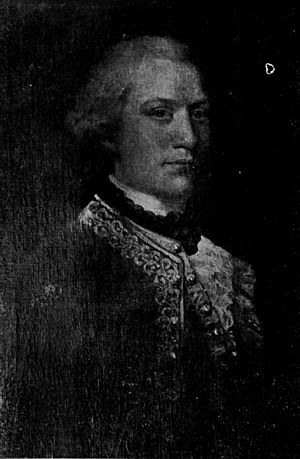Sir Donald Macdonald, 4th Baronet facts for kids
Quick facts for kids
Sir Donald Macdonald, 4th Baronet
|
|
|---|---|

Sir Donald Macdonald, Bt
|
|
| Nickname(s) | Dòmhnall a' Chogaidh |
| Born | 1650 |
| Died | March 1718 |
| Allegiance | |
| Commands held | Clan Macdonald of Sleat |
| Battles/wars | Jacobite rising of 1689 Jacobite rising of 1715 |
| Spouse(s) | Mary Macdonald |
| Relations | Sir James Mor Macdonald (grandfather) |
Sir Donald Macdonald, 4th Baronet (born 1650 – died March 1718) was an important Scottish clan chief and soldier. He led the Clan Macdonald of Sleat. Sir Donald was a Jacobite, meaning he supported the Stuart family's claim to the British throne. People knew him as Dòmhnall a' Chogaidh, which means "Donald of the War." After 1716, his Jacobite supporters called him Lord Sleat.
Contents
Sir Donald's Early Life and Family
Sir Donald Macdonald was the son of Sir Donald Macdonald, 3rd Baronet. His mother was Lady Mary Douglas. His grandfather, Sir James Mor Macdonald, 2nd Baronet, had supported King Charles II of England. This meant his family had a history of supporting the royal family.
Leading the Clan in Battle
Sir Donald became the leader of his clan because his father was unwell. In 1689, he led his clan to support King James VII during the Jacobite rising of 1689. This was a time when many people fought to bring James VII back to the throne. Sir Donald's clan fought bravely at the Battle of Killiecrankie. They suffered many losses in this battle. After the fighting, his clan made peace with the new government.
Becoming a Baronet
In 1695, Sir Donald inherited his father's titles and lands. He became the 4th Baronet. He moved to Glasgow and did not spend much time with his clan on the Isle of Skye. However, he stayed in touch with people who supported the Jacobite cause. In 1714, he was briefly arrested. People thought he was still a Jacobite supporter. But he was released later that year. This happened with help from the Duke of Montrose.
The 1715 Jacobite Rising
In 1715, another Jacobite uprising began. The government ordered Sir Donald to come to Edinburgh. He was told to promise his loyalty to King George I of Great Britain. If he did not, he would go to prison for a year. Instead of going to Edinburgh, Sir Donald joined the uprising. He went to Skye to gather his followers. He had between 700 and 900 men ready to fight.
In October 1715, Sir Donald and his men joined the Earl of Seaforth. They met at Brahan Castle and then went to Alness. Sir Donald's men fought in the Battle of Sheriffmuir in November. But Sir Donald became sick during this time. He had to return to Skye. When government soldiers came to Skye, he fled to North Uist.
Later Life and Exile
In April 1716, Sir Donald wanted to surrender. A new law allowed people to surrender if they were part of the uprising. But he said he was too sick to travel to Inverlochy Castle to surrender in person. Because he did not appear, he was found guilty of not following the law. This meant his lands were taken away by the government.
Sir Donald then fled to France. He joined the exiled Stuart court there. On December 23, 1716, he was given the title Lord Sleat by the Jacobite court. He might have returned to Scotland before he died in 1718.
Family and Successor
Sir Donald Macdonald married Mary Macdonald. They had one son and four daughters. His son, Sir Donald Macdonald, 5th Baronet, took over his titles after his death.
 | Aurelia Browder |
 | Nannie Helen Burroughs |
 | Michelle Alexander |

